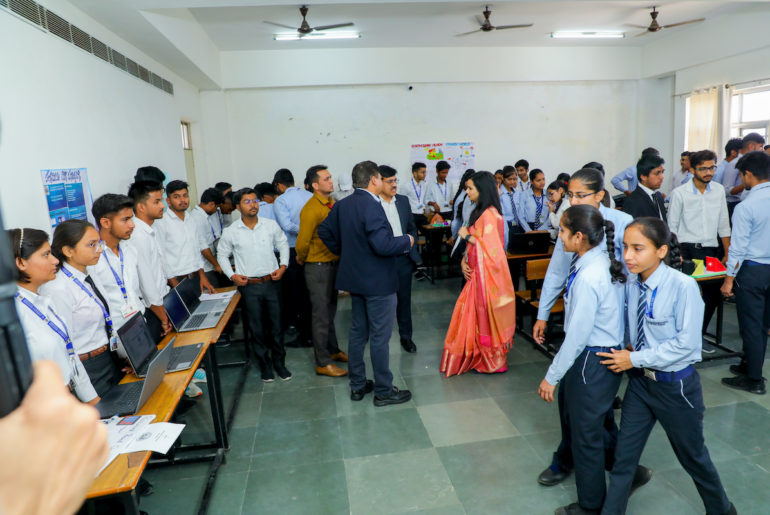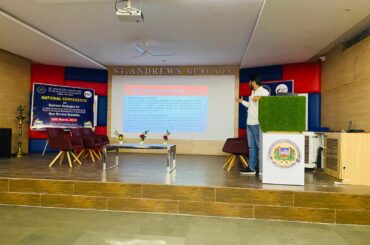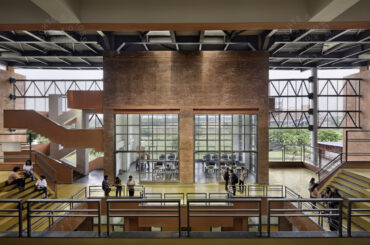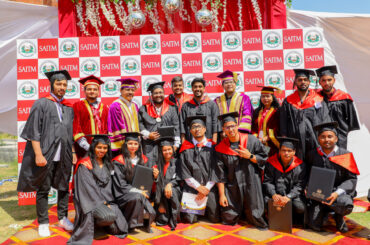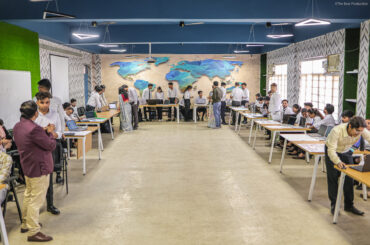BTech Course Duration
The B Tech course duration is typically four years, divided into eight semesters. Each semester lasts about six months and includes theoretical lessons, practical labs, projects, and internships.
Some universities offer accelerated programs that allow completion in three years for high-performing students, while others may extend the duration due to co-op programs or academic challenges. Specialized dual degree or integrated programs might also alter the standard timeline.
The four-year B Tech course duration ensures a comprehensive education in engineering, preparing students for professional careers or further studies in various engineering and technology fields.
Some of the most opted courses in India and St. Andrews college or different Engineering college or Management colleges are as follows:-
- Btech
- Btech CSE
- Btech ETCE
- MTech
- BCA
- BBA
- MBA
- MCA
- DPharma – St. Andrews College of Pharmacy
- BPharma – St. Andrews College of Pharmacy
- BArch – St. Andrews College of Architecture
B Tech Course

A Bachelor of Technology (B.Tech) is a four-year undergraduate program designed to provide students with a comprehensive education in various fields of engineering and technology. The B Tech course duration is structured into eight semesters, blending theoretical knowledge with practical applications to equip students with the skills required for solving complex engineering problems.
The B.Tech curriculum typically includes core subjects such as Mathematics, Physics, and Chemistry in the initial semesters. As the B Tech course duration progresses, students take specialized courses in their chosen engineering discipline—such as Computer Science Engineering, Mechanical Engineering, Software Engineering, Civil, Electrical Engineering, Electronics, Chemical, or Biotechnology—in the later semesters. Alongside classroom lectures, students engage in laboratory work, workshops, internships, and project-based learning to gain hands-on experience.
Admission to BTech courses usually requires candidates to have completed their 10+2 education with a strong emphasis on science subjects and to clear btech entrance exams such as JEE Main, JEE Advanced, or state-level exams. Some institutions also conduct their own entrance tests.
BTech graduates are well-prepared for a wide range of career opportunities in engineering, technology, and related fields. Through the B Tech course duration, they gain the skills needed to work in industries like IT, manufacturing, construction, and research, or pursue higher studies such as MTech or MBA. The degree also fosters innovation and entrepreneurship, enabling graduates to start their own ventures.
BTech Course Eligibility Criteria
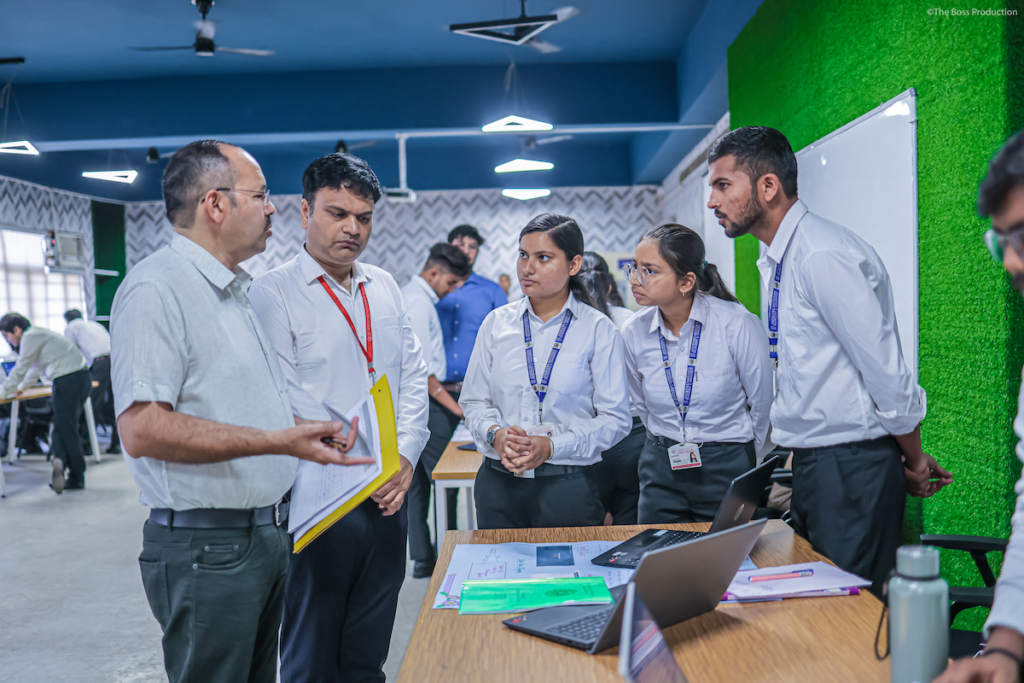
Here’s a comprehensive overview of the typical eligibility criteria:
Educational Qualification
Completion of 10+2 or Equivalent
- Candidates must have successfully completed their 12th grade or an equivalent examination from a recognized board of education.
- The qualifying examination should include subjects such as Physics, Chemistry, and Mathematics (PCM) as mandatory subjects.
Minimum Marks Requirement
- General Category: Most institutions require candidates to have secured a minimum of 50-60% aggregate marks in PCM. The exact percentage may vary from one institution to another.
- Reserved Categories (SC/ST/OBC and Others): There is usually a relaxation of 5-10% in the minimum aggregate marks for candidates belonging to reserved categories. This means they may need to secure a minimum of 45-50% aggregate marks in PCM.
Entrance Examinations
National Level Entrance Examinations
- Joint Entrance Examination (JEE) Main: Conducted by the National Testing Agency (NTA), JEE Main is one of the most common entrance examinations for admission to B Tech courses across India. Many central and state-level institutions, including NITs, accept JEE Main scores.
- Joint Entrance Examination (JEE) Advanced: Administered for admission to the Indian Institutes of Technology (IITs). Candidates must first qualify JEE Main to be eligible to appear for JEE Advanced.
- Other National Exams: Other national-level exams like BITSAT (for BITS Pilani) and VITEEE (for VIT) are also popular.
State Level Entrance Exams
- Many states conduct their own entrance examinations for admission to BTech programs in state engineering colleges. Examples include MHT-CET (Maharashtra), KCET (Karnataka), WBJEE (West Bengal), and AP EAMCET (Andhra Pradesh).
Age Limit
Minimum Age Requirement
- Generally, candidates should be at least 17 years of age at the time of admission or should turn 17 on or before December 31 of the year of admission.
Upper Age Limit
- The upper age limit varies with institutions and entrance exams. For example, the upper age limit for JEE Main is usually around 25 years for general category candidates, with a relaxation of 2-3 years for candidates belonging to reserved categories.
Additional Criteria
Domicile Requirements
- For state-level institutions, there may be domicile requirements. A certain percentage of seats might be reserved for candidates who are residents of that particular state. Proof of residency may be required during the admission process.
Medical Fitness
- Some institutions may require candidates to meet specific medical fitness standards. This could include a general health check-up to ensure that the candidate is medically fit to pursue the course.
Specific Eligibility Criteria Examples
Indian Institutes of Technology (IITs)
- Candidates must qualify in the JEE Advanced exam.
- They typically need to have secured at least 75% aggregate marks in their 12th-grade board exams (65% for SC/ST/PwD candidates) or be in the top 20 percentile of their respective board.
National Institutes of Technology (NITs)
- Admission is primarily through JEE Main scores.
- Similar to IITs, candidates usually need to have secured a certain minimum percentage in their 12th-grade exams, often around 75% for general category candidates.
State-Level Institutes
- Admission is often based on state-level entrance exams.
- The required percentage in 12th-grade exams and other criteria may vary by state but generally fall around 45-50% for general category candidates.
Private Institutions
- These institutions may accept scores from national-level exams like JEE Main or conduct their own entrance exams.
- The percentage requirements in 12th-grade exams are similar to those of national institutions, often requiring around 50-60% aggregate marks in PCM.
Highlights of BTech Course
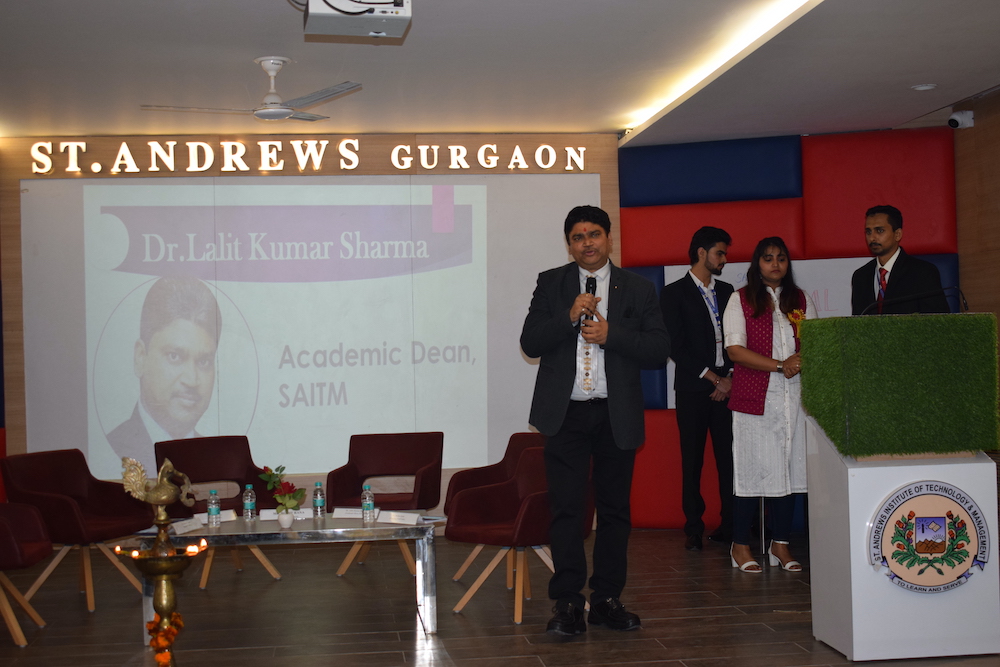
Here are some highlights of a typical B.Tech (Bachelor of Technology) course:
Core Subjects
Engineering Mathematics: Fundamental mathematical concepts and techniques used in engineering.
Programming Languages: Introduction to programming in languages such as C, C++, Java, Python.
Data Structures & Algorithms: Study of data organization, storage, and manipulation.
Electronics and Communication: Basics of electronic circuits, communication systems.
Database Management Systems (DBMS): Concepts of database design, management, and implementation.
Operating Systems: Understanding of OS fundamentals, process management, memory management.
Specializations
Computer Science Engineering (CSE): Focuses on software development, algorithms, and computing systems.
Information Technology (IT): Emphasizes on the use of technology in business processes.
Electronics and Communication Engineering (ECE): Covers electronic devices, communication systems.
Mechanical Engineering: Involves the design and manufacturing of mechanical systems.
Civil Engineering: Focuses on infrastructure, construction, and civil projects.
Practical Knowledge
Laboratories: Hands-on experience in labs related to core subjects (e.g., programming labs, electronics labs).
Projects: Practical application of learned concepts through individual or group projects.
Internships: Exposure to real-world industry experience, often during summer breaks.
Industry Exposure
Guest Lectures: Sessions by industry professionals and experts.
Workshops/Seminars: Specialized sessions on current trends and technologies.
Industrial Visits: Tours of manufacturing plants, research centers, or tech companies.
Skills Development
Technical Skills: Proficiency in relevant software, tools, and techniques.
Soft Skills: Communication, teamwork, problem-solving, and leadership skills.
Project Management: Understanding of managing and executing engineering projects.
Assessment Methods
Exams: Periodic tests and final exams to assess theoretical knowledge.
Assignments: Written tasks to evaluate understanding and application of concepts.
Presentations: Evaluation through individual or group presentations.
Career Opportunities
Software Developer: Design, develop, and maintain software applications.
Systems Analyst: Analyze and improve computer systems and processes.
Network Engineer: Manage and maintain network infrastructure.
Consultant: Provide expert advice in specialized areas like cybersecurity or data management.
BTech Admission Process
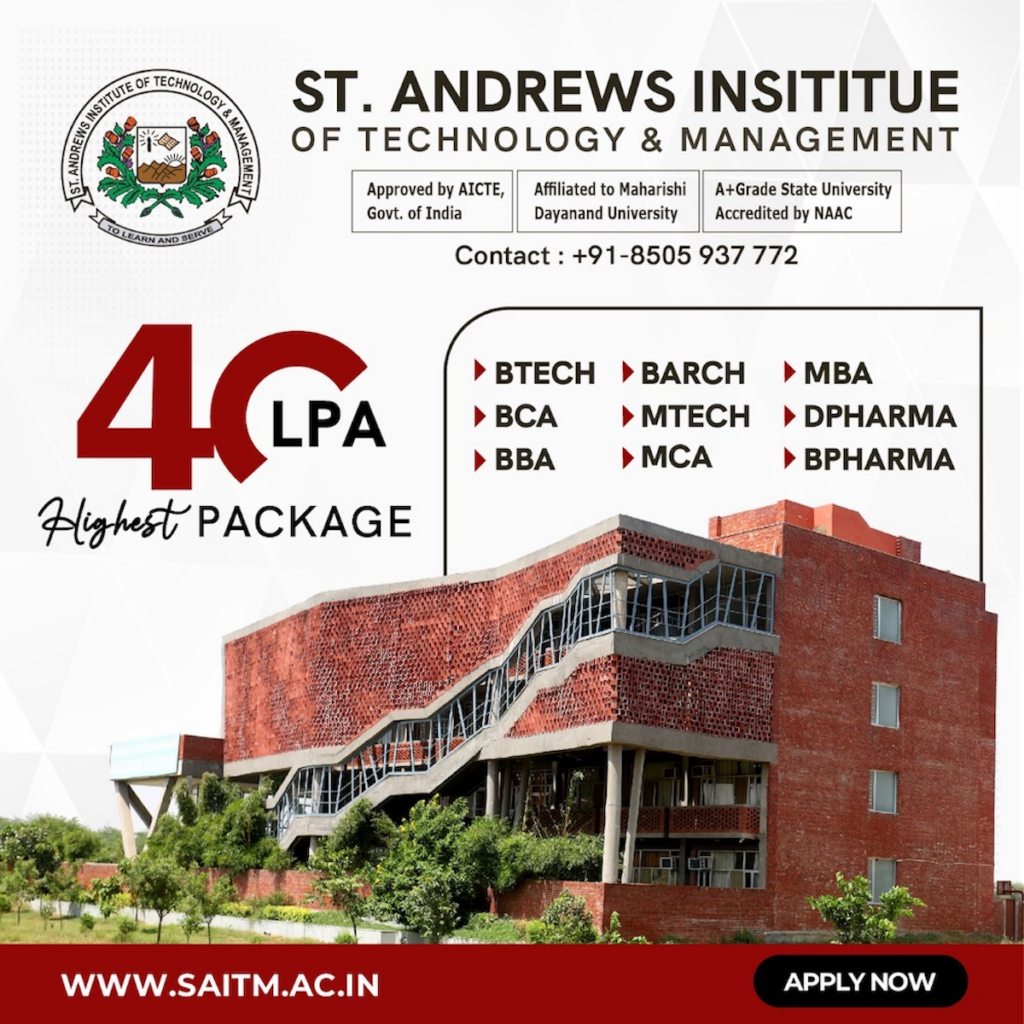
1. Eligibility Criteria
- Education: Completion of 10+2 (or equivalent) with a focus on Physics, Chemistry, and Mathematics.
- Minimum Marks: Typically, a minimum percentage is required, often around 50-60%, depending on the institution.
- Entrance Exams: Most institutions require students to clear entrance exams like JEE Main, JEE Advanced, state-level exams, or institute-specific tests.
2. Entrance Exams
- JEE Main: Conducted by NTA (National Testing Agency), it’s the primary exam for admission to many engineering colleges in India.
- JEE Advanced: For admission to IITs (Indian Institutes of Technology), taken after clearing JEE Main.
- State-Level Exams: Some states have their own entrance exams, such as MHT-CET (Maharashtra), KCET (Karnataka), and others.
- Institution-Specific Exams: Some private universities and colleges have their own entrance tests, such as BITSAT (BITS Pilani), VITEEE (VIT), etc.
3. Application Process
- Online Registration: Candidates need to register online on the respective exam or college website.
- Form Submission: Fill out and submit the application form along with necessary documents like academic certificates, ID proof, and photographs.
- Application Fee: Pay the required application fee as specified by the institution or examination authority.
4. Entrance Exam Preparation
- Preparation: Study relevant subjects thoroughly and consider coaching classes if needed.
- Mock Tests: Take practice tests to familiarize yourself with the exam format and time management.
5. Examination
- Admit Card: Download the admit card from the exam website before the exam date.
- Exam Day: Attend the exam as per the schedule and follow the instructions provided.
6. Result Declaration
- Results: Check the results on the official website of the respective exam authority or institution.
- Rank List: Based on the scores, a merit list or rank list is published for counseling purposes.
7. Counseling and Seat Allocation
- Counseling Process: Participate in the counseling process organized by the respective examination authority or institution.
- Document Verification: Submit original documents for verification and choose preferred colleges and branches based on your rank and availability.
- Seat Allotment: Allocate seats based on merit, preferences, and availability.
8. Admission Confirmation
- Fee Payment: Pay the admission fee to confirm your seat at the allocated institution.
- Joining: Complete the formalities, attend orientation programs, and begin your B.Tech course.
9. Commencement of Classes
- Start Date: Classes typically commence a few weeks after the admission process is completed.
- Integration: Familiarize yourself with the campus, faculty, and course structure.
BTech Study Duration: Overview
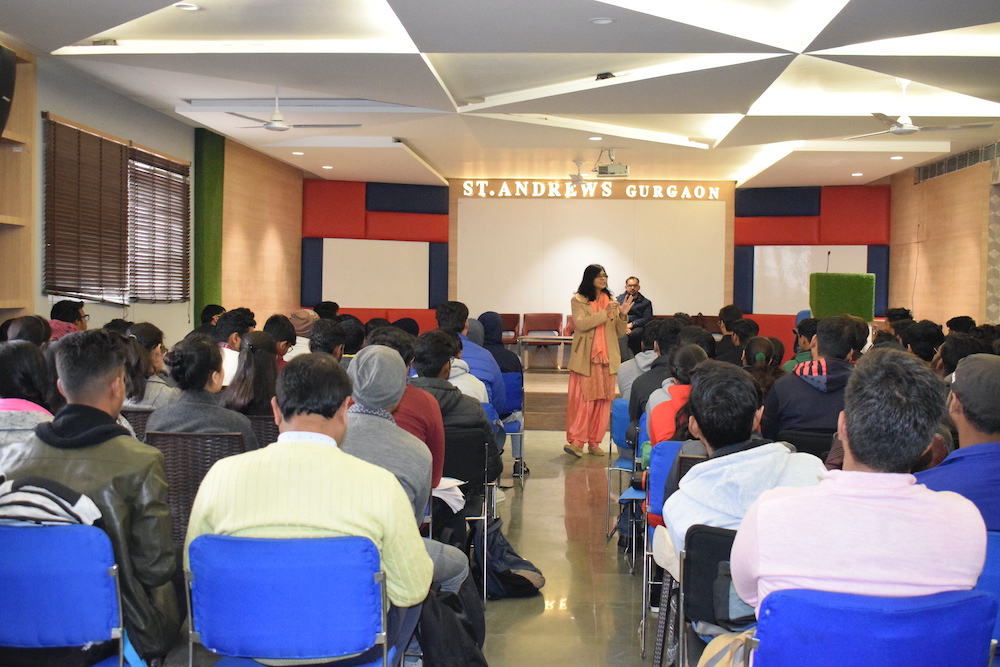
The Bachelor of Technology (B.Tech) course is designed to provide a thorough education in engineering and technology. The B Tech course duration follows a structured timeframe to ensure comprehensive learning.
Standard Duration
- Typical Length: The standard B Tech course duration is four years.
- Structure: Divided into eight semesters, each lasting approximately six months. The curriculum includes both theoretical coursework and practical labs.
Accelerated Programs
- Description: Some institutions offer accelerated BTech degrees that can be completed in three years for exceptionally high-achieving students.
- Eligibility Criteria: Usually requires outstanding academic performance and specific institutional criteria.
Extended Duration
- Description: The program duration may extend beyond four years due to factors such as internships, co-op programs, or academic challenges.
- Impact: Additional time may be needed to meet graduation requirements or complete specialized projects.
Dual Degree and Integrated Programs
- Description: Some institutions offer dual degree or integrated programs that combine B.Tech with other degrees or certifications.
- Duration: These programs may extend the study period beyond the traditional four years, often up to five years or more.
Comparison with Other Degrees
- B.Tech vs BE: Both degrees generally have a similar duration, but specific institutions or programs may differ slightly.
- B.Tech vs BCA: BCA (Bachelor of Computer Applications) typically has a three-year duration, focusing more on computer applications than engineering.
BTech Specializations
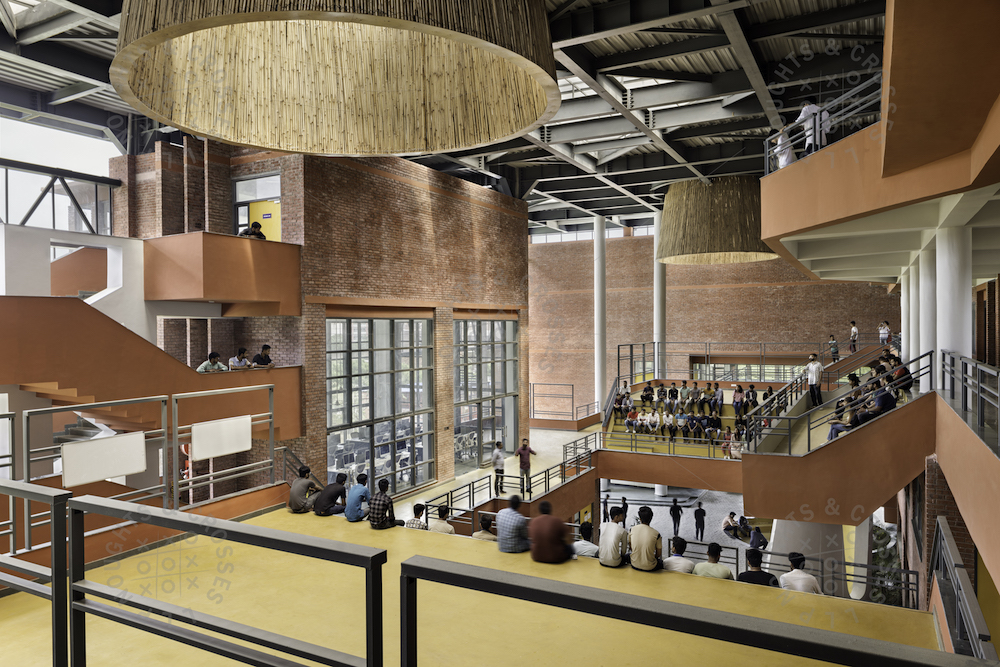
Here are some of the popular B.Tech specializations:
Computer Science Engineering (CSE)
- Focus: Software development, algorithms, data structures, artificial intelligence, cloud computing, machine learning, and computer networks.
- Career Paths: Software developer, data scientist, AI engineer, cybersecurity expert, systems analyst.
Mechanical Engineering
- Focus: Design, manufacturing, and maintenance of mechanical systems, thermodynamics, fluid mechanics, and robotics.
- Career Paths: Mechanical engineer, robotics engineer, automotive engineer, product designer, project manager.
Civil Engineering
- Focus: Construction, design, and maintenance of infrastructure such as buildings, roads, bridges, and dams.
- Career Paths: Civil engineer, structural engineer, project manager, urban planner, construction manager.
Electrical Engineering
- Focus: Study and application of electricity, electronics, and electromagnetism, including power systems, control systems, and telecommunications.
- Career Paths: Electrical engineer, control systems engineer, power systems engineer, telecommunications engineer.
Electronics and Communication Engineering (ECE)
- Focus: Design and development of electronic devices, communication systems, integrated circuits, and signal processing.
- Career Paths: Electronics engineer, communication engineer, signal processing engineer, embedded systems developer.
Information Technology (IT)
- Focus: Information systems, network management, database systems, cybersecurity, and web technologies.
- Career Paths: IT consultant, network administrator, database manager, web developer, cybersecurity analyst.
Chemical Engineering
- Focus: Chemical processes, production of chemicals, pharmaceuticals, fuel, food, and materials through chemical reactions.
- Career Paths: Chemical engineer, process engineer, research scientist, quality control engineer.
Aerospace Engineering
- Focus: Design, development, and testing of aircraft and spacecraft, aerodynamics, propulsion systems, and avionics.
- Career Paths: Aerospace engineer, aerodynamics engineer, propulsion engineer, systems engineer.
Biotechnology
- Focus: Application of biological systems and organisms to develop products and technologies in fields like medicine, agriculture, and environmental management.
- Career Paths: Biotechnologist, research scientist, bioinformatics specialist, clinical research associate.
Automobile Engineering
- Focus: Design, development, and manufacturing of vehicles, automotive systems, and components.
- Career Paths: Automotive engineer, design engineer, production engineer, quality control engineer.
Environmental Engineering
- Focus: Solutions to environmental problems, sustainable development, waste management, water and air pollution control.
- Career Paths: Environmental engineer, sustainability consultant, water resource engineer, environmental consultant.
Industrial Engineering
- Focus: Optimization of complex processes, systems, and organizations, including production, manufacturing, and service industries.
- Career Paths: Industrial engineer, operations manager, quality assurance engineer, supply chain analyst.
Petroleum Engineering
- Focus: Exploration, extraction, and production of oil and gas, including drilling, reservoir management, and production operations.
- Career Paths: Petroleum engineer, drilling engineer, reservoir engineer, production engineer.
Biomedical Engineering
- Focus: Application of engineering principles to healthcare and medical technologies, including medical devices, diagnostics, and prosthetics.
- Career Paths: Biomedical engineer, clinical engineer, medical device designer, research scientist.
BTech Fee Structure
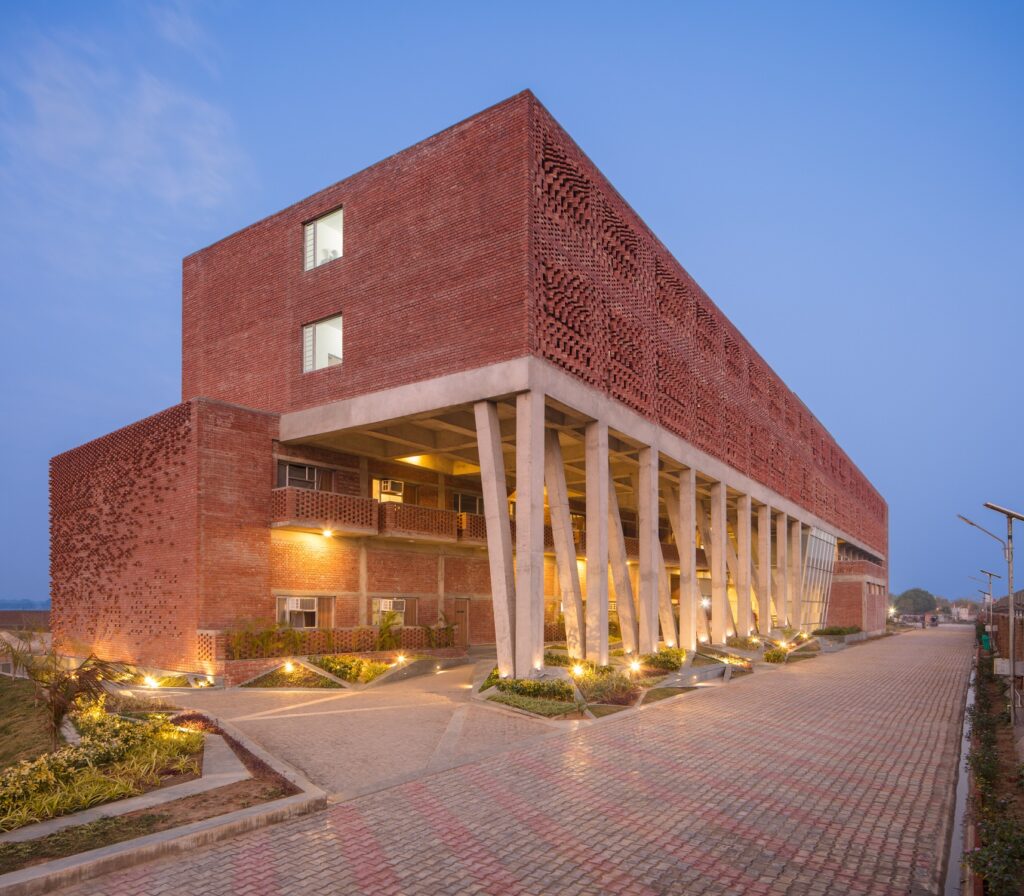
Here’s an overview of the typical fee ranges in India:
Government Colleges
- Indian Institutes of Technology (IITs)
- Annual Fees: ₹2 to ₹3 lakhs
- Total Fees for 4 Years: ₹8 to ₹12 lakhs
- National Institutes of Technology (NITs)
- Annual Fees: ₹1.25 to ₹2 lakhs
- Total Fees for 4 Years: ₹5 to ₹8 lakhs
- State Government Engineering Colleges
- Annual Fees: ₹50,000 to ₹1.5 lakhs
- Total Fees for 4 Years: ₹2 to ₹6 lakhs
Private Colleges
- Top Private Institutes (e.g., SAITM Gurgaon, BITS Pilani, VIT)
- Annual Fees: ₹98,500 to ₹4 lakhs
- Total Fees for 4 Years: ₹10 to ₹16 lakhs
- Mid-Tier Private Institutes
- Annual Fees: ₹1.5 to ₹2.5 lakhs
- Total Fees for 4 Years: ₹6 to ₹10 lakhs
Deemed Universities
- Annual Fees: ₹2 to ₹4 lakhs
- Total Fees for 4 Years: ₹8 to ₹16 lakhs
Other Fees and Expenses
- Hostel Fees: ₹30,000 to ₹1 lakh per annum
- Mess Charges: ₹25,000 to ₹50,000 per annum
- Books and Supplies: ₹10,000 to ₹20,000 per annum
- Other Miscellaneous Fees: ₹5,000 to ₹20,000 per annum
Scholarships and Financial Aid
- Many institutions offer scholarships based on merit, entrance exam scores, or financial need.
- Government scholarships and schemes like the Central Sector Scholarship, state-level scholarships, and private scholarships from companies and foundations can help reduce the financial burden.
Education Loans
- Students can avail themselves of education loans from banks and financial institutions, which typically cover tuition fees, hostel fees, and other related expenses.
- Interest rates and repayment terms vary, so it’s essential to compare options.
Example Fee Structures of Specific Institutions:
- Indian Institute of Technology (IIT) Delhi:
- Tuition Fee: ₹2 lakhs per annum
- Hostel and Mess Charges: ₹50,000 to ₹70,000 per annum
- Total for 4 Years: ₹9 to ₹11 lakhs
- St. Andrews Institute of Technology and Management (SAITM):
- Tuition Fee: ₹98,500 per annum
- Hostel and Mess Charges: ₹28,750 to ₹62,500 per semester
- Total for 4 Years: ₹7 lakhs
- Birla Institute of Technology and Science (BITS) Pilani:
- Tuition Fee: ₹3.5 lakhs per annum
- Hostel and Mess Charges: ₹70,000 to ₹1 lakh per annum
- Total for 4 Years: ₹14 to ₹17 lakhs
- Vellore Institute of Technology (VIT):
- Tuition Fee: ₹1.75 to ₹2.5 lakhs per annum
- Hostel and Mess Charges: ₹1 lakh per annum
- Total for 4 Years: ₹10 to ₹12 lakhs
Top BTech Colleges in India
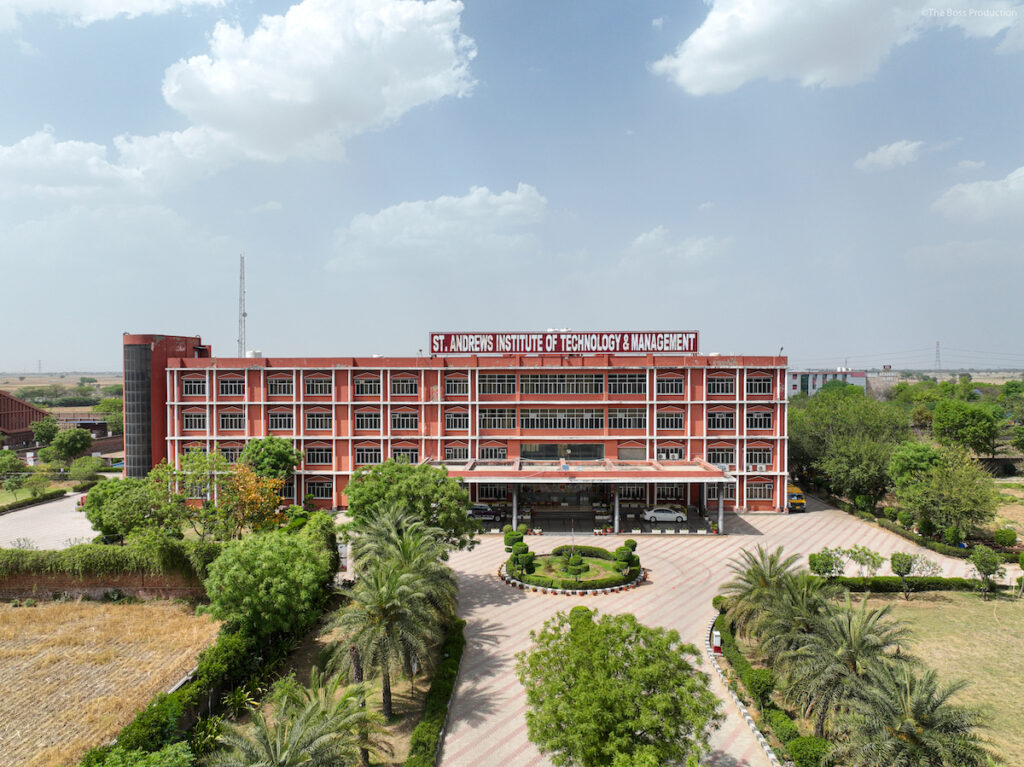
Here is a list of some of the top BTech colleges in India:
Indian Institute of Technology (IITs) Bombay, Delhi, Madras, Kanpur and Kharagpur
Highlights:
- Renowned for its engineering programs, research facilities, excellent placement records, high academic standards.
- Offers robust engineering programs with a focus on innovation and entrepreneurship.
- Famous for its research output, strong faculty, and comprehensive engineering education.
St. Andrews Institute of Technology and Management (SAITM)
Location: Gurgaon, Haryana
Highlights: Offers a range of B.Tech programs with a focus on practical learning and industry readiness.
Birla Institute of Technology and Science (BITS) Pilani
Location: Pilani, Rajasthan
Highlights: Offers high-quality education, strong research programs, and excellent campus facilities.
Vellore Institute of Technology (VIT)
Location: Vellore, Tamil Nadu
Highlights: Known for its rigorous academic curriculum, international collaborations, and high placement rates.
Delhi Technological University (DTU)
Location: Delhi
Highlights: Known for its strong industry links, research facilities, and comprehensive engineering programs.
Thapar Institute of Engineering and Technology
Location: Patiala, Punjab
Highlights: Offers quality engineering education, robust research programs, and excellent placement opportunities.
PSG College of Technology
Location: Coimbatore, Tamil Nadu
Highlights: Renowned for its engineering programs, strong industry collaborations, and research initiatives.
PES University
Location: Bangalore, Karnataka
Highlights: Known for its high academic standards, state-of-the-art infrastructure, and strong placement records.
Government BTech Colleges in India
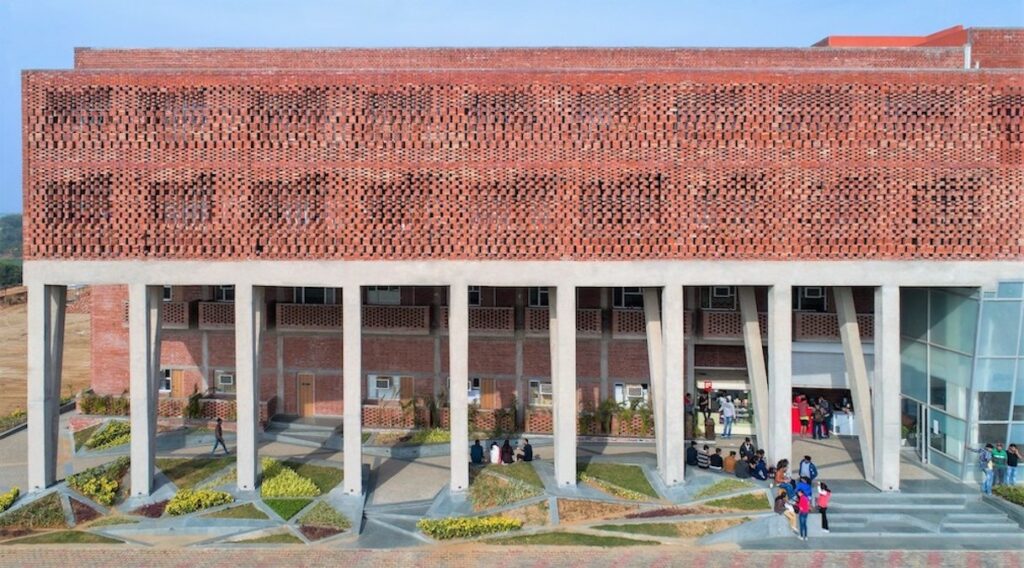
Here’s an updated list of notable government B.Tech colleges in India:
Delhi Technological University (DTU), Delhi
- Location: Delhi
- Highlights: Known for its strong industry connections and research facilities. Offers a wide range of engineering disciplines.
St. Andrews Institute of Technology and Management {SAITM}
- Location: Gurgaon, Haryana
- Highlights: Known for its diverse B.Tech programs and emphasis on practical learning and industry readiness.
Jawaharlal Nehru Technological University (JNTU), Hyderabad
- Location: Hyderabad, Telangana
- Highlights: Offers various engineering programs with a focus on research and development.
Punjab Engineering College (PEC), Chandigarh
- Location: Chandigarh
- Highlights: Renowned for its engineering programs and high placement rates.
Anna University, Chennai
- Location: Chennai, Tamil Nadu
- Highlights: Offers a broad spectrum of engineering disciplines and has strong ties with the industry.
Government College of Technology (GCT), Coimbatore
- Location: Coimbatore, Tamil Nadu
- Highlights: Known for its technical education and research initiatives.
Netaji Subhas Institute of Technology (NSIT), Delhi
- Location: Delhi
- Highlights: Part of the Delhi University system, known for its engineering excellence.
Government Engineering College, Jabalpur
- Location: Jabalpur, Madhya Pradesh
- Highlights: Offers various B.Tech programs with a focus on practical and theoretical learning.
Government College of Engineering (GCE), Aurangabad
- Location: Aurangabad, Maharashtra
- Highlights: Provides a range of engineering disciplines and has strong industry connections.
Kumaraguru College of Technology (KCT), Coimbatore
- Location: Coimbatore, Tamil Nadu
- Highlights: Known for its engineering programs and emphasis on research and development.
Top Private BTech Colleges in India
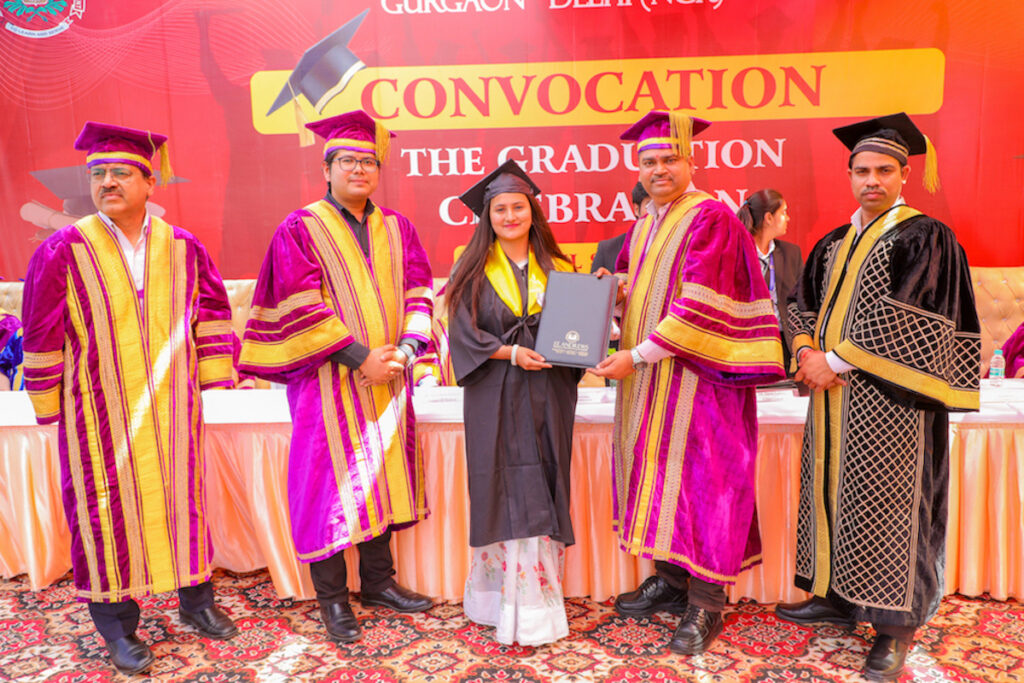
Here’s an list of notable Top private BTech colleges in India:
St. Andrews Institute of Technology and Management [SAITM];
- Location: Gurgaon, Haryana
- Highlights: Offers a range of B.Tech programs with a focus on industry-oriented education and practical experience.
Vellore Institute of Technology (VIT), Vellore
- Location: Vellore, Tamil Nadu
- Highlights: Known for its comprehensive engineering programs and strong placement opportunities.
Birla Institute of Technology and Science (BITS), Pilani
- Location: Pilani, Rajasthan
- Highlights: Renowned for its research-driven approach and high academic standards.
Shiv Nadar University (SNU), Greater Noida
- Location: Greater Noida, Uttar Pradesh
- Highlights: Known for its focus on research and innovative teaching methods.
LPU (Lovely Professional University), Phagwara
- Location: Phagwara, Punjab
- Highlights: Offers a variety of engineering disciplines with a focus on industry readiness and global exposure.
Sathyabama Institute of Science and Technology, Chennai
- Location: Chennai, Tamil Nadu
- Highlights: Known for its engineering programs and research initiatives.
Kumaraguru College of Technology (KCT)
- Location: Coimbatore, Tamil Nadu
- Highlights: Offers a broad spectrum of engineering programs with strong industry connections.
Techno India University, Kolkata
- Location: Kolkata, West Bengal
- Highlights: Known for its diverse engineering courses and emphasis on practical learning.
BTech Scope
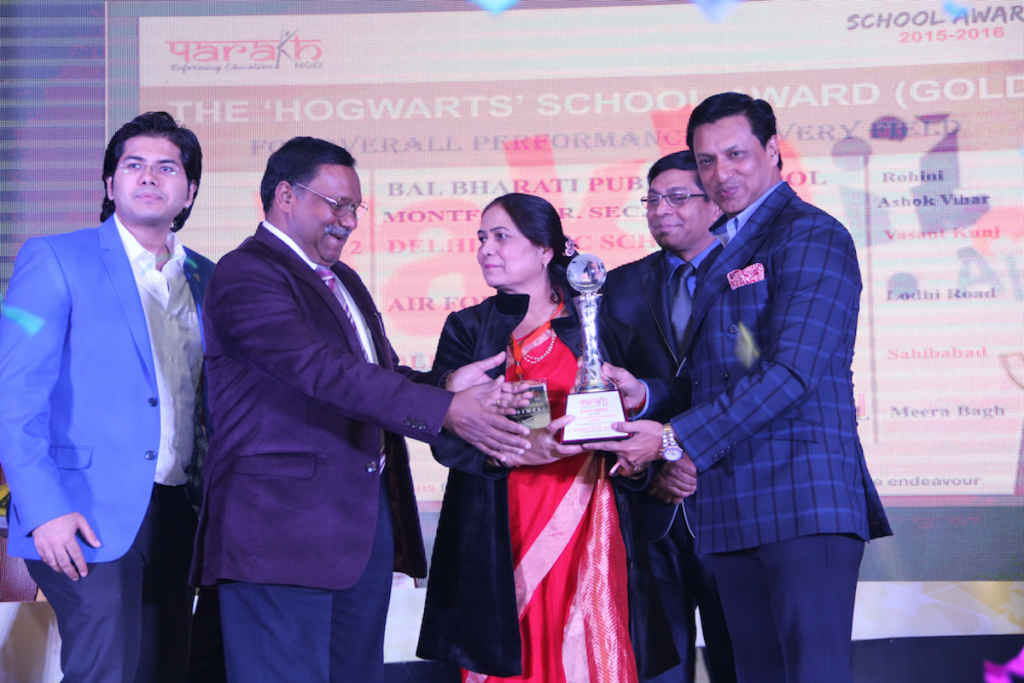
Here are some key areas highlighting the scope of a B.Tech degree:
1. Employment Opportunities
- Industries: Graduates can find employment in various industries such as Information Technology, Manufacturing, Construction, Electronics, Telecommunications, Automotive, Aerospace, Energy, and more.
- Roles: Common roles include Software Engineer, Systems Analyst, Mechanical Engineer, Civil Engineer, Electrical Engineer, and more.
- Companies: Reputable companies like Google, Microsoft, Infosys, TCS, L&T, Tata Motors, and others frequently hire B.Tech graduates.
2. Higher Studies
- Master’s Degrees: Pursuing higher education such as MTech, MBA, or MS can enhance knowledge and career prospects.
- Specializations: Specializing in a particular field through advanced studies can open up niche career opportunities and roles in academia or research.
3. Research and Development
- Innovation: Graduates can engage in research and development (R&D) roles in industries or academic institutions, contributing to technological advancements and innovations.
- Research Institutes: Opportunities exist in renowned research institutes like ISRO, DRDO, and CSIR.
4. Entrepreneurship
- Startups: A B.Tech degree provides a solid foundation for launching tech startups or businesses in various engineering domains.
- Innovation Hubs: With increasing support for innovation and entrepreneurship, graduates can leverage incubators and accelerators to grow their ventures.
5. Government Jobs
- Public Sector Units (PSUs): Graduates can apply for technical roles in PSUs like BHEL, ONGC, NTPC, and GAIL through competitive exams like GATE.
- Civil Services: B.Tech graduates can also pursue careers in civil services by appearing for exams like UPSC, offering roles in administrative and engineering services.
6. Global Opportunities
- International Careers: A B.Tech degree from a reputed Indian institution can open doors to international job markets, especially in countries with high demand for engineers.
- Global Companies: Opportunities exist in multinational companies and international research collaborations.
7. Professional Certifications
- Certifications: Obtaining certifications in specialized fields like cybersecurity, data science, project management, or network engineering can enhance job prospects and professional growth.
- Professional Development: Continuous learning through professional development programs helps in staying updated with industry trends.
8. Diverse Fields
- Interdisciplinary Roles: B.Tech graduates can explore interdisciplinary roles that combine engineering with fields like finance, management, healthcare, and environmental science.
- Consulting: Engineering consultancy is a lucrative field where graduates can provide expert advice to various industries.
9. Academia
- Teaching: Graduates with a passion for teaching can pursue academic careers by becoming faculty members in engineering colleges and universities.
- Research: Engaging in academic research and contributing to scholarly publications and conferences.
10. Skill Development
- Technical Skills: The curriculum and projects during B.Tech help in developing strong technical skills relevant to various engineering fields.
- Soft Skills: Emphasis on communication, teamwork, and problem-solving skills, which are essential in professional environments.
Career Opportunities After BTech
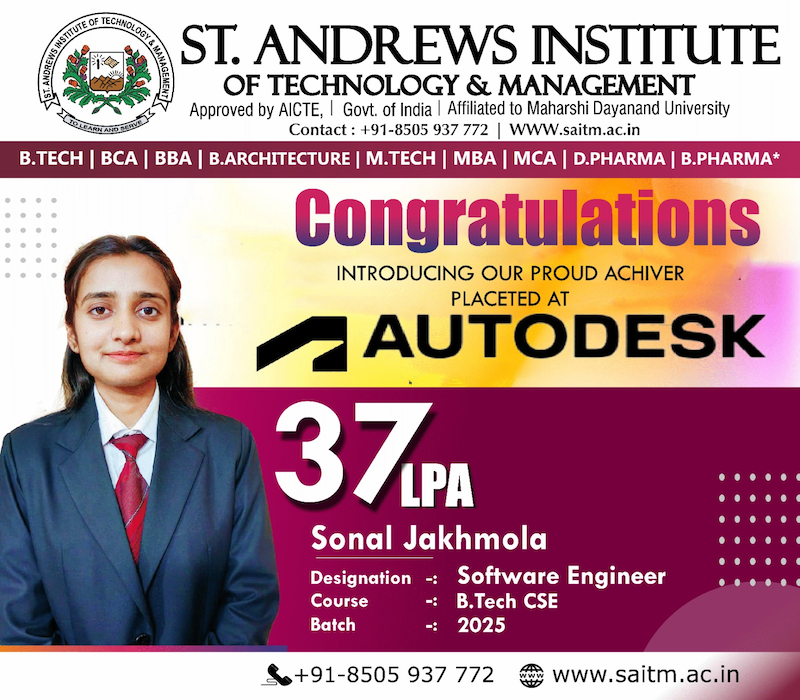
Here’s a detailed look at some of the potential career paths and opportunities available:
Corporate Sector
Software Development
- Roles: Software Developer, Software Engineer, Application Developer
- Key Responsibilities: Designing, coding, testing, and maintaining software applications.
IT Services
- Roles: IT Consultant, Systems Analyst, Network Administrator
- Key Responsibilities: Managing IT infrastructure, providing technical support, and ensuring systems run smoothly.
Data Analysis and Data Science
- Roles: Data Analyst, Data Scientist, Business Intelligence Analyst
- Key Responsibilities: Analyzing data to provide insights, developing data models, and supporting decision-making.
Cybersecurity
- Roles: Cybersecurity Analyst, Ethical Hacker, Security Consultant
- Key Responsibilities: Protecting systems and networks from cyber threats, conducting security assessments, and implementing security measures.
Project Management
- Roles: Project Manager, Product Manager, Project Coordinator
- Key Responsibilities: Overseeing projects, managing resources, and ensuring project delivery within budget and timeline.
Engineering and Manufacturing
Core Engineering
- Roles: Design Engineer, Mechanical Engineer, Electrical Engineer
- Key Responsibilities: Designing, developing, and improving engineering products and systems.
Research and Development (R&D)
- Roles: Research Engineer, Development Engineer, R&D Scientist
- Key Responsibilities: Conducting research to innovate new technologies and improve existing ones.
Manufacturing
- Roles: Production Engineer, Quality Control Engineer, Process Engineer
- Key Responsibilities: Managing production processes, ensuring quality standards, and optimizing manufacturing operations.
Government Sector
Public Sector Jobs
- Roles: Public Sector Undertakings (PSUs) Engineer, Government Analyst, Technical Officer
- Key Responsibilities: Working in various government departments, public enterprises, and research organizations.
Defense and Civil Services
- Roles: Indian Engineering Services (IES) Officer, Defense Engineer, Indian Administrative Service (IAS) Officer
- Key Responsibilities: Serving in defense, administrative roles, and other government positions.
Entrepreneurship
- Roles: Startup Founder, Business Owner, Technology Entrepreneur
- Key Responsibilities: Starting and managing your own business, developing new products or services, and scaling operations.
Higher Education and Specialization
Pursue Advanced Degrees
- Options: MTech, MBA, MS, or PhD
- Key Responsibilities: Specializing in a particular field, conducting research, and pursuing advanced career opportunities.
Certification Courses
- Options: Certifications in Data Science, Cloud Computing, Artificial Intelligence, etc.
- Key Responsibilities: Gaining specialized knowledge and skills to enhance career prospects.
Consulting
- Roles: Technology Consultant, Management Consultant, Engineering Consultant
- Key Responsibilities: Advising businesses on technology solutions, management practices, and engineering strategies.
Academia and Teaching
- Roles: Lecturer, Assistant Professor, Researcher
- Key Responsibilities: Teaching engineering subjects, conducting research, and contributing to academic advancements.
Freelancing and Remote Work
- Roles: Freelance Developer, Remote IT Specialist, Independent Consultant
- Key Responsibilities: Working on a project basis, offering specialized services, and working remotely for clients across the globe.
Social Impact and NGOs
- Roles: Technology for Development Specialist, Social Impact Consultant
- Key Responsibilities: Applying technical skills to solve social issues, working with non-profits, and contributing to community development projects.
Top Recruiters for BTech Graduates
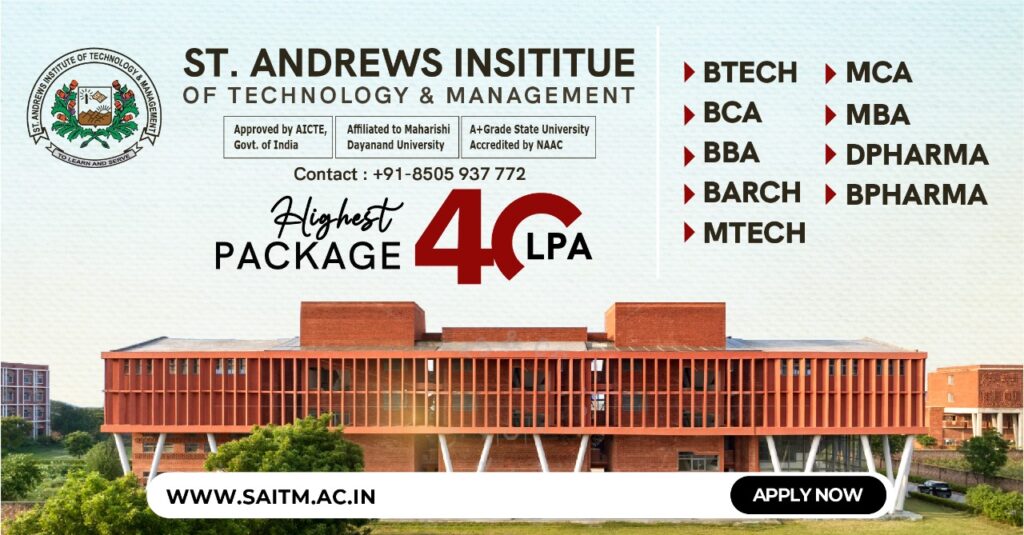
Here are some of the top recruiters:
Information Technology and Software
Tata Consultancy Services (TCS)
Infosys
Wipro
HCL Technologies
Accenture
IBM
Microsoft
Amazon
Oracle
Electronics and Telecommunications
Samsung
Nokia
Sony
Qualcomm
Intel
CISCO Systems
Broadcom
Automotive
Tata Motors
Mahindra & Mahindra
Maruti Suzuki
Honda
Ford
Toyota
Bosch
Mechanical and Manufacturing
Siemens
Bharat Heavy Electricals Limited (BHEL)
Godrej Group
Ashok Leyland
Kirloskar
Energy and Power
Indian Oil Corporation Limited (IOCL)
Reliance Industries
Oil and Natural Gas Corporation (ONGC)
NTPC Limited
Adani Group
Civil and Construction
Larsen & Toubro (L&T)
DLF
Gammon India
Hindustan Construction Company (HCC)
Sobha Developers
Consulting
PwC (PricewaterhouseCoopers)
KPMG
Ernst & Young (EY)
McKinsey & Company
Research and Development
Indian Space Research Organisation (ISRO)
Defence Research and Development Organisation (DRDO)
Council of Scientific and Industrial Research (CSIR)
National Aeronautics and Space Administration (NASA)
Google Research
Banking and Financial Services
Goldman Sachs
JP Morgan Chase
Barclays
Citibank
HSBC
Salary After BTech
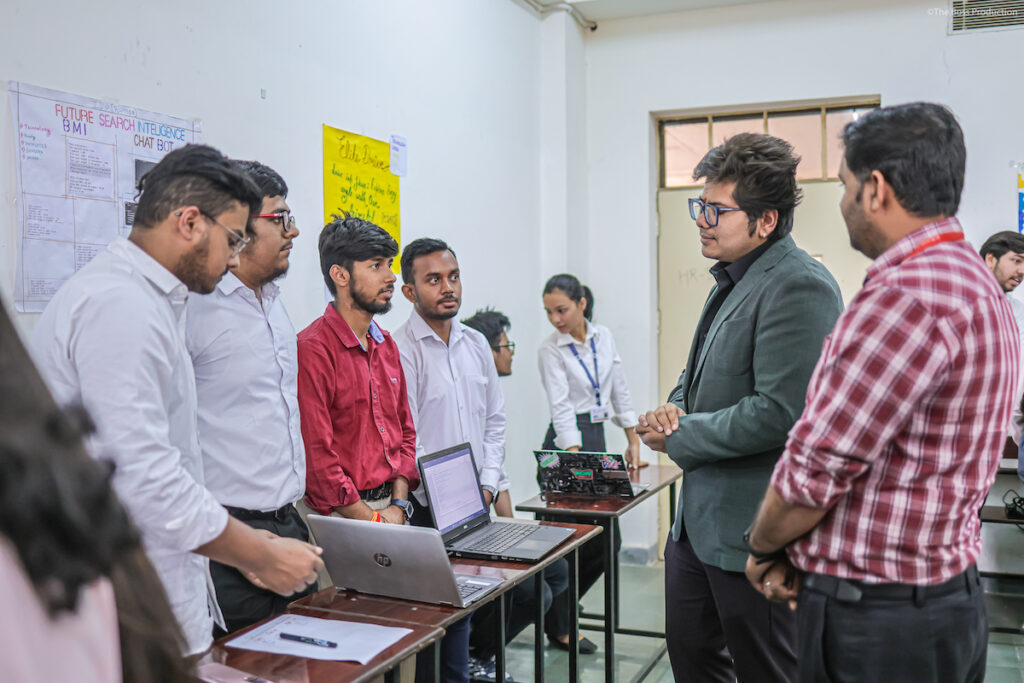
Here’s an overview of the typical salary ranges for B.Tech graduates in India:
1. Entry-Level Salaries
- Range: ₹3 to ₹6 lakhs per annum
- Common Roles: Software Developer, Junior Engineer, System Analyst, Graduate Engineer Trainee, Technical Support Engineer
2. Mid-Level Salaries
- Range: ₹6 to ₹12 lakhs per annum
- Common Roles: Senior Software Engineer, Project Manager, Systems Engineer, Design Engineer, Quality Assurance Engineer
3. Senior-Level Salaries
- Range: ₹12 to ₹25 lakhs per annum
- Common Roles: Technical Lead, Engineering Manager, Senior Project Manager, Principal Engineer, Solutions Architect
4. Specialized Roles
- Data Scientist: ₹8 to ₹20 lakhs per annum
- Machine Learning Engineer: ₹6 to ₹18 lakhs per annum
- Cybersecurity Expert: ₹8 to ₹15 lakhs per annum
- Artificial Intelligence Engineer: ₹10 to ₹20 lakhs per annum
- Blockchain Developer: ₹6 to ₹18 lakhs per annum
5. Industry-Specific Salaries
- Information Technology (IT): ₹4 to ₹10 lakhs per annum
- Automotive: ₹4 to ₹9 lakhs per annum
- Electronics and Telecommunications: ₹3 to ₹8 lakhs per annum
- Construction and Civil Engineering: ₹3 to ₹7 lakhs per annum
- Energy and Power: ₹4 to ₹9 lakhs per annum
6. Location Impact
- Metropolitan Cities (Bangalore, Mumbai, Delhi, Hyderabad, Chennai): Higher salaries due to cost of living and concentration of tech companies.
- Tier-2 and Tier-3 Cities: Relatively lower salaries but with potential for growth as industries expand.
7. Company Reputation
- MNCs and Top Tech Firms: Higher starting packages, typically ranging from ₹6 to ₹12 lakhs per annum.
- Startups: May offer variable salaries, often compensated with stock options and other perks.
8. Public Sector Units (PSUs)
- Salaries: ₹8 to ₹12 lakhs per annum for positions secured through exams like GATE.
- Roles: Engineers in IOCL, ONGC, BHEL, NTPC, and other government organizations.
9. International Opportunities
- Salaries: Significantly higher compared to domestic roles, with packages ranging from ₹15 to ₹50 lakhs per annum, depending on the country and company.
- Roles: Positions in global tech firms, research institutions, and multinational corporations.
Skills Required for BTech Students

Analytical Skills
- Description: Ability to assess complex problems and devise effective solutions.
- Importance: Critical for understanding and solving engineering challenges.
Technical Proficiency
- Description: Knowledge of engineering principles, software tools, and technical methods relevant to the chosen discipline.
- Importance: Essential for performing tasks and using engineering software effectively.
Problem-Solving Skills
- Description: Capability to identify issues, evaluate options, and implement solutions.
- Importance: Key for tackling engineering problems and developing innovative solutions.
Mathematical Skills
- Description: Strong grasp of mathematical concepts and techniques used in engineering analysis.
- Importance: Fundamental for calculations, modeling, and understanding technical problems.
Communication Skills
- Description: Ability to convey ideas clearly and effectively, both verbally and in writing.
- Importance: Necessary for collaborating with teams, presenting projects, and writing reports.
Teamwork and Collaboration
- Description: Ability to work effectively with others in group projects and team settings.
- Importance: Vital for successful project execution and functioning in multidisciplinary teams.
Time Management;
- Description: Skill in organizing and prioritizing tasks to meet deadlines and manage workloads.
- Importance: Important for balancing coursework, projects, and extracurricular activities.
Research and Analytical Skills
- Description: Ability to conduct research, analyze data, and interpret results.
- Importance: Useful for completing projects, theses, and staying current with industry trends.
Adaptability and Learning Agility
- Description: Willingness to learn new technologies and adapt to changing environments.
- Importance: Essential for keeping up with advancements in engineering fields and evolving industry standards.
Practical and Hands-On Skills
- Description: Experience with laboratory work, experiments, and practical applications of theoretical knowledge.
- Importance: Crucial for applying concepts in real-world scenarios and gaining hands-on experience.
Critical Thinking
- Description: Ability to evaluate arguments and evidence, make reasoned judgments, and solve complex problems.
- Importance: Important for analyzing and addressing engineering problems effectively.
Leadership and Initiative
- Description: Capability to lead projects, take initiative, and drive improvements.
- Importance: Beneficial for leading teams, managing projects, and pursuing career advancement.
Challenges Faced by BTech Students

Academic Pressure
Description: Rigorous coursework and high expectations can lead to significant stress.
Impact: May affect mental health and overall well-being, requiring effective stress management strategies.
Time Management {TM}
Description: Balancing coursework, projects, exams, and extracurricular activities can be challenging.
Impact: Poor time management can lead to missed deadlines and academic performance issues.
Complex Subject Matter
Description: Engineering topics can be highly technical and complex, often requiring deep understanding.
Impact: May lead to difficulties in grasping concepts and performing well in exams and assignments.
Practical Work and Labs
Description: Hands-on experiments and lab work can be demanding and time-consuming.
Impact: Requires precision and attention to detail, which can be challenging for some students.
Entrance Exams and Competitive Pressure
Description: High competition for admission to top B.Tech colleges and for internships.
Impact: Students may experience anxiety and pressure to perform well in entrance exams and secure internships.
Adapting to New Technologies
Description: Rapid advancements in technology necessitate continuous learning and adaptation.
Impact: Students must stay updated with the latest tools and technologies, which can be overwhelming.
Financial Constraints
Description: The cost of tuition, books, and other expenses can be a burden.
Impact: Financial stress can affect academic focus and overall student experience.
Balancing Theory and Practical Experience
Description: Integrating theoretical knowledge with practical application can be difficult.
Impact: Students may struggle to apply concepts in real-world scenarios effectively.
Internship and Job Placement:
Description: Securing internships and job placements in a competitive job market.
Impact: Can create uncertainty and anxiety about future career prospects.
Communication and Soft Skills Development
Description: Technical education often focuses more on hard skills, potentially neglecting soft skills.
Impact: Students may need to actively work on improving communication, teamwork, and leadership skills.
Adjustment to College Life
Description: Transitioning from high school to a more independent college environment can be challenging.
Impact: Adjusting to new responsibilities and living away from home can cause initial difficulties.
Keeping Up with Research and Innovation
Description: Staying abreast of ongoing research and technological advancements.
Impact: Essential for staying competitive but can be demanding to follow.
FAQs
What is the standard B Tech course duration?
The standard B Tech course duration is four years, typically divided into eight semesters.
What is the duration of a BTech course?
A BTech programme typically spans four years, divided into eight semesters. Each semester lasts about six months, combining theoretical learning, practical labs, and project work. Some universities offer accelerated programs, allowing completion in three years for high-achieving students. Extended durations may occur due to internships, co-op programs, or academic challenges. Specialized dual degree or integrated programs might also alter the standard timeline. Overall, the four-year structure is designed to provide a comprehensive education in engineering, preparing students for professional careers or further studies.
What is a B Tech degree?
A Bachelor of Technology (B.Tech) degree is an undergraduate program focused on engineering and technology. The B Tech course duration typically spans four years, providing students with a solid foundation in scientific and mathematical principles. It also offers specialized knowledge in various engineering disciplines such as computer science engineering, mechanical engineering, civil engineering, electronics engineering, and software engineering. The curriculum combines theoretical coursework with practical labs, projects, and internships to prepare students for technical careers. Graduates of B.Tech programs are equipped with the skills needed to solve complex engineering problems, innovate in their fields, and pursue advanced studies or professional opportunities in technology and engineering sectors.
Is BTech 3 years or 4 years?
A B.Tech (Bachelor of Technology) degree typically spans four years. The B Tech course duration is divided into eight semesters, each lasting about six months. The curriculum includes a mix of theoretical coursework, practical labs, projects, and internships, providing a comprehensive education in the chosen engineering field. However, some accelerated programs may allow high-achieving students to complete the degree in three years. Additionally, dual degree or integrated programs, which combine B.Tech with other qualifications, may extend the study period beyond four years. The standard duration remains four years, ensuring students gain both depth and breadth in their engineering education.
Can I do BTech after 12th?
Yes, you can pursue a B.Tech (Bachelor of Technology) degree after completing your 12th grade. To be eligible, you typically need to have completed 12th grade with a focus on science subjects, particularly Physics, Chemistry, and Mathematics. Additionally, you must qualify for relevant entrance exams such as JEE Main, JEE Advanced, or state-level engineering entrance tests. These exams assess your aptitude and knowledge in science and mathematics. Given the B Tech course duration, successful candidates will undergo four years of rigorous academic and practical training in their chosen engineering discipline at various engineering colleges and universities.
What is the qualification for BTech?
To qualify for a B.Tech program, candidates typically need to have completed their 10+2 (or equivalent) education with a strong foundation in science, particularly in subjects like Physics, Chemistry, and Mathematics. They must achieve a minimum percentage, often around 50-60%, depending on the institution. Additionally, candidates must clear relevant engineering entrance examinations such as JEE Main, JEE Advanced, or state-level exams. Some institutions also conduct their own entrance tests. Given the B Tech course duration, diploma holders in engineering or technology may apply for lateral entry into the second year. Eligibility criteria can vary by institution, so it’s essential to check specific requirements.
Can I do BTech Degree without maths?
Generally, mathematics is a mandatory subject for admission to B.Tech programs, as it is fundamental to engineering principles. However, some institutions may offer specific B.Tech specializations or related courses that have different requirements. For example, certain universities might accept students with a background in biology for biotechnology or biomedical engineering programs. It’s essential to check the specific eligibility criteria of the institution you are interested in. Given the B Tech course duration, a strong foundation in mathematics is crucial, as math is integral to the curriculum and problem-solving in engineering. Without it, pursuing a traditional B.Tech program can be challenging.
Can the B Tech course duration be shorter or longer?
Yes, some accelerated programs allow high-achieving students to complete the degree in three years, while dual degree or integrated programs may extend the study period beyond four years.

